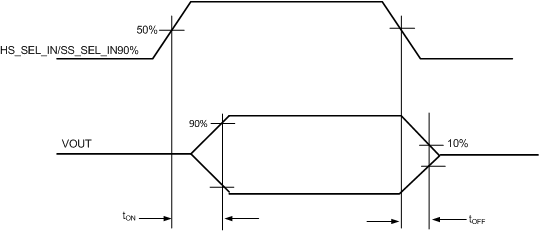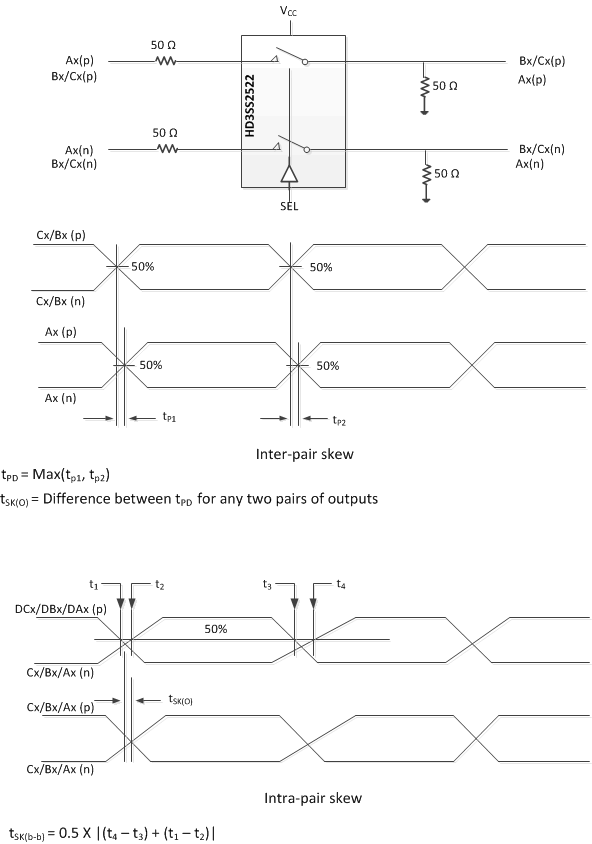-
HD3SS2522 USB Type-C SS MUX with DFP Controller
- 1 Features
- 2 Applications
- 3 Description
- 4 Revision History
- 5 Pin Configuration and Functions
- 6 Specifications
- 7 Detailed Description
- 8 Application and Implementation
- 9 Power Supply Recommendations
- 10Layout
- 11Device and Documentation Support
- 12Mechanical, Packaging, and Orderable Information
- IMPORTANT NOTICE
Package Options
Mechanical Data (Package|Pins)
- RHU|56
Thermal pad, mechanical data (Package|Pins)
Orderable Information
HD3SS2522 USB Type-C SS MUX with DFP Controller
1 Features
- Compliant to USB Type-C Specification 1.1
- Mode Configuration
- Host Only – DFP
- Channel Configuration (CC)
- Attach of USB Port Detection
- Cable Orientation Detection
- Type-C Current Mode (Default, Mid, High)
- Supply Voltage 3.3 V ± 10%
- 2:1 Mux Solution for USB 3.1 Signaling
- Operates up to 10 Gbps with Wide -3 dB BW of 8 GHz
- Excellent Dynamic Characteristics at 2.5 GHz
- Crosstalk = –39 dB
- Off Isolation = –22 dB
- Insertion Loss = –1.2 dB
- Input Return Loss = –12 dB
- Low Active (2 mW) and Standby Power (50 μW) Consumption
2 Applications
- Desktop and Notebook PCs
- USB Type-C DFP Applications
- Motherboards
3 Description
HD3SS2522 is a 2:1 USB mux with Configuration Channel (CC) logic with Downstream Facing Port (DFP) support. The HD3SS2522 presents itself as a DFP according to the USB Type-C Spec. The CC logic block monitors the CC1 and CC2 pins voltages to determine when a USB port has been attached. Once a USB port has been attached, the CC logic also determines the orientation of the cable and configures the USB SS mux accordingly.
The HD3SS2522 provides an VBUS_EN signal to control legacy power switch to provide 5 V to VBUS. The device also provides control signals needed to support 5 V VCONN sourcing for ecosystems implementing USB Type-C.
Excellent dynamic characteristics of the device allow high speed switching with minimum attenuation to the signal eye diagram and little added jitter. The device also has low current consumption in Standby mode.
Device Information(1)
| PART NUMBER | PACKAGE | BODY SIZE (NOM) |
|---|---|---|
| HD3SS2522 | WQFN (56) | 11.00 mm x 5.00 mm |
- For all available packages, see the orderable addendum at the end of the data sheet.
Simplified Schematic

5 Pin Configuration and Functions

Pin Functions
6 Specifications
6.1 Absolute Maximum Ratings
over operating free-air temperature range (unless otherwise noted) (1)| MIN | MAX | UNIT | ||
|---|---|---|---|---|
| Power supply voltage range, VCC | –0.4 | 4 | V | |
| Voltage Range | Differential I/O (High bandwidth signal path, AxP/N, BxP/N, CxP/N) | –0.4 | 2.4 | |
| Control Pins and Single Ended I/Os including CC1 and CC2 | –0.4 | VCC + 0.4 | ||
6.2 ESD Ratings
| VALUE | UNIT | |||
|---|---|---|---|---|
| V(ESD) | Electrostatic discharge | Human-body model (HBM), per ANSI/ESDA/JEDEC JS-001(1) | ±2000 | V |
| Charged-device model (CDM), per JEDEC specification JESD22-C101(2) | ±500 | |||
6.3 Recommended Operating Conditions
over operating free-air temperature range (unless otherwise noted)| MIN | NOM | MAX | UNIT | |||
|---|---|---|---|---|---|---|
| VCC | Supply voltage | 3 | 3.3 | 3.6 | V | |
| VIH | Input high voltage | Control/Status pins | 2 | VCC | V | |
| VIL | Input low voltage | Control/Status pins | –0.1 | 0.8 | V | |
| VI/O(Diff) | Differential voltage | Switch I/O diff voltage | 0 | 1.6 | VPP | |
| VI/O(CM) | Common voltage | Switch I/O common mode voltage | 0 | 2 | V | |
| VI/O | Input / output voltage | CC_OUT, CC_IN, and selected CC pin for configuration | 0 | VCC | V | |
| VIN | Input voltage | Selected CC pin for VCONN | 0 | 5.5 | V | |
| TA | Operating free-air temperature | HD3SS2522RHU | 0 | 70 | °C | |
6.4 Thermal Information
| THERMAL METRIC(1) | HD3SS2521A | UNIT | |
|---|---|---|---|
| RHU | |||
| 56 PINS | |||
| RθJA | Junction-to-ambient thermal resistance | 31.6 | °C/W |
| RθJC(top) | Junction-to-case (top) thermal resistance | 15.9 | |
| RθJB | Junction-to-board thermal resistance | 8.5 | |
| ψJT | Junction-to-top characterization parameter | 0.5 | |
| ψJB | Junction-to-board characterization parameter | 8.5 | |
| RθJC(bot) | Junction-to-case (bottom) thermal resistance | N/A | |
6.5 Electrical Characteristics
over operating free-air temperature range (unless otherwise noted)| PARAMETER | TEST CONDITIONS | MIN | TYP | MAX | UNIT | |
|---|---|---|---|---|---|---|
| ICC | Supply current | VCC = 3.6 V, SS_OEn, CC_OEn = GND |
0.6 | 1 | mA | |
| I(STANDBY) | Standby current | VCC = 3.3 V, SS_OEN, CC_OEn = VCC | 15 | µA | ||
| VBUS_FAULT#, VCONN_FAULT#, IMODE1, IMODE2, RST, RSVD, GPIO1, GPIO2 | ||||||
| VIT+ | Positive-going input threshold voltage | 0.45 x VCC | 0.75 x VCC | V | ||
| VIT- | Negative-going input threshold voltage | 0.25 x VCC | 0.55 x VCC | V | ||
| Vhys | nput voltage hysteresis (VIT+ – VIT–) | VCC = 3 V | 0.3 | 1 | V | |
| RPULL | Pullup/pulldown resistor | Pullup: VIN = GND, Pulldown: VIN = VCC, VCC = 3 V |
20 | 35 | 50 | kΩ |
| CI | Input capacitance | VIN = GND or VCC | 5 | pF | ||
| ILGK | High-impedance leakage current | VIN = GND or VCC, VCC = 3 V, Pullup/Pulldown disabled |
±50 | nA | ||
| VCTRL1, VCTRL2, VBUS_EN | ||||||
| VOL | Low-level output voltage | IOL(max) = 6 mA (1) | GND + 0.3 | V | ||
| MODE_LED | ||||||
| VOH | High-level output voltage | IOH(max) = –6 mA (1) | VCC – 0.3 | V | ||
| VOL | Low-level output voltage | IOL(max) = 6 mA (1) | GND + 0.3 | V | ||
| AxP/N, BxP/N, CxP/N | ||||||
| ILGK | High-impedance leakage current | VCC = 3.6 V, VIN = 0 V, VOUT = 2 V (ILKG on open outputs Port B and C) |
130 | µA | ||
| VCC = 3.6 V, VIN = 0 V, VOUT = 2 V (ILKG on open outputs Port A) |
4 | µA | ||||
| CC1, CC2 | ||||||
| ILGK | High-impedance leakage current | VCC = 3.6 V, VIN = 0 V, VOUT = 0 V to 4 V |
1 | µA | ||
6.6 Timing Requirements
| MIN | NOM | MAX | UNIT | |||
|---|---|---|---|---|---|---|
| AxP/N, BxP/N, CxP/N HIGH-BANDWIDTH SIGNAL PATH | ||||||
| tPD | Switch Propagation Delay | RSC and RL = 50 Ω | 85 | ps | ||
| tON | SS_SEL_IN -to-Switch tON | RSC and RL = 50 Ω | 70 | 250 | ns | |
| tOFF | SS_SEL_IN -to-Switch tOFF | 70 | 250 | ns | ||
 Figure 1. Select to Switch tON and tOFF
Figure 1. Select to Switch tON and tOFF

6.7 Switching Characteristics
over operating free-air temperature range (unless otherwise noted)| PARAMETER | TEST CONDITIONS | MIN | TYP | MAX | UNIT | |
|---|---|---|---|---|---|---|
| AxP/N, BxP/N, CxP/N | ||||||
| tSK(O) | Inter-pair output skew (channel-channel) |
RSC and RL = 50 Ω | 20 | ps | ||
| tSK(b-b) | Inter-pair output skew (bit-bit) | 8 | ps | |||
| CON | Outputs ON capacitance | VIN = 0 V, outputs open, switch ON | 1.5 | pF | ||
| COFF | Outputs OFF capacitance | VIN = 0 V, outputs open, switch OFF | 1 | pF | ||
| RON | Output ON resistance | VCC = 3.3 V, VCM = 0.5 V – 1.5 V, IO = –8 mA |
5 | 8 | Ω | |
| ΔRON | On resistance match between channels | VCC = 3.3 V; –0.35 V ≤ VIN ≤ 1.2 V; IO = –8 mA |
2 | Ω | ||
| On resistance match between pairs of the same channel | 0.7 | |||||
| R(FLAT_ON) | On resistance flatness [RON(MAX) – RON(MIN)] |
VCC = 3.3 V; –0.35 V ≤ VIN ≤ 1.2 V | 1.15 | Ω | ||
| RL | Differential input return loss (VCM = 0 V) |
f = 2.5 GHz | –12 | dB | ||
| f = 4 GHz | –11 | |||||
| XTALK | Differential crosstalk (VCM = 0 V) | f = 2.5 GHz | –39 | dB | ||
| f = 4 GHz | –35 | |||||
| OIRR | Differential off-isolation (VCM = 0 V) | f = 2.5 GHz | –22 | dB | ||
| f = 4 GHz | –19 | |||||
| IL | Differential insertion loss (VCM = 0 V) |
f = 2.5 GHz | –1.1 | dB | ||
| f = 4 GHz | –1.5 | |||||
| BW | Bandwidth | At 3 dB | 6 | GHz | ||